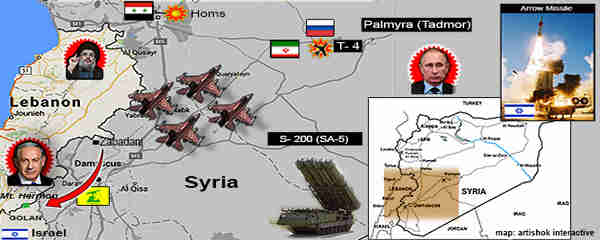This morning’s key headlines from GenerationalDynamics.com
- Israel and Syria have unprecedented missile clash over Jordan
- Russia summons Israeli envoy to demand an explanation
- Jordan has to live with increasing threats from Syria and Israel
Israel and Syria have unprecedented missile clash over Jordan

Map of region. Israeli warplanes struck Lebanon-bound convoy near the T-4 airbase near Palmyra. Syrian Russian-made S-200 ground to air missiles targeted the Israeli planes without success. One was intercepted by Israel’s Arrow missile system. This map also depicts a claim by Debka that Hezbollah may be planning an attack on Israeli-held Mount Hermon. (Debka)
The most serious incident between Israel and Syria since the Syrian civil war began six years ago occurred early Friday morning when Syrian anti-aircraft missiles were shot down by Israel’s Arrow 3 anti-missile defense system. The Syrian missiles were targeting Israeli warplanes attacking a convoy of trucks carrying advanced weapons from northern Syria to Hezbollah in Lebanon.
Israel’s warplanes were attacking a convoy of trucks leaving Syria’s T-4 airbase near Palmyra in northern Syria. The trucks were believed to be carrying advanced weapons systems to be delivered to Hezbollah in Lebanon for use in its attacks on Israel. The advanced weapons may have included precision rockets, advanced anti-aircraft missiles, and surface-to-ship missiles.
Israel has attacked weapons convoys traveling from Syria to Lebanon in the past, but the first thing that is unprecedented about this attack is that it has been confirmed by Israel’s military. In the past, Israel has refused to comment on its attacks on weapons convoys. However, in April 2016, Israel’s prime minister Benjamin Netanyahu admitted for the first time that Israel had in the past attacked dozens of convoys transporting weapons in Syria destined for Hezbollah.
The second unprecedented thing is that the regime of Syria’s president Bashar al-Assad launched three or four ground-to-air missiles to attack the Israeli warplanes. In the case of past attacks on weapons convoys, there were no such anti-aircraft missile attacks.
The missiles were apparently outdated Russian-made S-200 (SA-5) surface-to-air missiles. Syria launched them when Israel’s warplanes were in Israeli airspace. According to one report, it is possible that the missile attack on the convoy was launched from the warplanes while they were still in Israeli airspace. Syria claims to have downed one Israeli plane, but Israel says that none of its planes was hit. However, at least one of the missiles was headed for Israeli territory.
The third unprecedented thing is that Israel launched an Arrow-3 anti-missile missile to intercept the incoming missile before it reached Israeli territory. This is the first time that the Arrow system has made an operational appearance.
Israel would have liked to keep its use of the Arrow system secret, but when it intercepted the incoming Syrian missile, it made a deafening bang that could be heard for more than 150 km. The Syrian missile was intercepted over the Jordan Valley in the West Bank, and parts of the missile landed in Jordan, doing little or no damage.
This unprecedented clash between Israel and Syria may indicate that the rules have changed. Israel has attacked weapons convoys in the past, but only when there were major weapons systems being delivered to Hezbollah, as was apparently the case this time. Weapons convoys with smaller weapons have not been attacked.
But while the al-Assad regime has threatened in the past to retaliate. After another Israeli airstrike in January, that al-Assad regime said that it would no longer tolerate any such incursions on Syrian airspace. This this is the first time the threat has been put into action. This may signal that al-Assad, secure in support from Russia and Iran, may now try to shift the war to Israel. Haaretz (Israel) and CNN and Debka and SANA (Damascus)
Related Articles
- Syria says that Israel bombed al-Mazzeh military airport near Damascus (14-Jan-2017)
- Hezbollah building tunnels into Israel to prepare for next war (04-Jun-2016)
- Hezbollah suffers blow in death of top commander Mustafa Amine Badreddine (14-May-2016)
- Deep Saudi-Lebanon crisis widens the Mideast’s sectarian fault line (10-Mar-2016)
Russia summons Israeli envoy to demand an explanation
On Friday, Russia summoned Israel’s ambassador to Moscow Gary Koren and demanded an explanation for the attack. According to a statement by Russia’s Foreign Ministry, “recent developments in Syria” were discussed.
Israel’s attacks on weapons convoys in the past could only have taken place with Russia’s approval, though obviously not with the approval of the al-Assad regime, Hezbollah or Iran. Russia considers itself to be an ally of both Syria and Israel, and does not wish to allow a war to develop between them, so, therefore, tolerates the Israeli attacks on weapons convoys going to Hezbollah.
In this case, Russia may have been concerned because the airstrikes occurred near the T-4 airbase that houses Russian weapons, warplanes and helicopters, and is a landing field for Iranian supply planes. What’s not clear at this time is whether Russia wants to change the rules of the game and limit Israel’s attacks on such convoys.
However, after Koren met with Russian officials, a defiant Israeli prime minister Benjamin Netanyahu said that Israel would not change its policy:
When we identify attempts to transfer advanced arms to Hezbollah, and we have intelligence information and we have the operational plan, we act to prevent it. That’s how it was yesterday and that’s how we shall continue to act.
We are fully determined and the evidence of that it that we are acting. Everybody must take that into account — everybody.
By “everybody,” we can assume that he’s referring to Russia, as well as to Syria, Hezbollah and Iran. Generational Dynamics predicts that the Mideast is headed for a major regional war, pitting Jews against Arabs, Sunnis against Shias, and various ethnic groups against each other. France 24 and Western Journalism and AFP
Jordan has to live with increasing threats from Syria and Israel
A strategic analyst in Jordan said on Saturday that Jordan will have to live with security threats, as long as the war in Syria continues. He was responding to the situation where shrapnel from the Syria-Israel missile exchange landed in Jordan.
According to Rt. Major General Fayez Dweiri
This is a violation of Jordan’s airspace from both the Israeli and the Syrian sides. Jordan does not possess the military capability to prevent such attacks.
The Kingdom has to live with this situation. What it can do is to manage the situation, to neutralize any threats as much as it can under the circumstances.
Related Articles
- Jordan’s King demands more refugee aid from international community (03-Feb-2016)
- Jordan’s King Abdullah tells Congress that Palestinian issue is the core issue (08-Mar-2007)
KEYS: Generational Dynamics, Israel, Syria, T-4 airbase, Palmyra, S-200 SA-5 missiles, Arrow 3 anti-missile, Russia, Gary Koren, Lebanon, Hezbollah, Iran, Benjamin Netanyahu, Jordan Valley, West Bank, Jordan, Rt. Major General Fayez Dweiri
Permanent web link to this article
Receive daily World View columns by e-mail

COMMENTS
Please let us know if you're having issues with commenting.